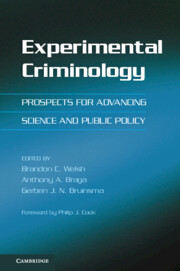Book contents
- Frontmatter
- Contents
- Contributors
- Foreword
- Preface
- 1 Experimenting with Crime and Criminal Justice
- Part I Experimenting with Crime
- Part II Experimenting with Crime Prevention and Criminal Justice
- 6 Randomized Experiments in Criminology
- 7 Increasing Equivalence in Small-Sample Place-Based Experiments
- 8 Multisite Randomized Trials in Criminology
- 9 Using Regression Discontinuity Designs in Crime Research
- 10 Quasi-Experimentation When Random Assignment Is Not Possible
- Part III Assessing Research Evidence and Future Directions
- Index
- References
8 - Multisite Randomized Trials in Criminology
Published online by Cambridge University Press: 05 June 2014
- Frontmatter
- Contents
- Contributors
- Foreword
- Preface
- 1 Experimenting with Crime and Criminal Justice
- Part I Experimenting with Crime
- Part II Experimenting with Crime Prevention and Criminal Justice
- 6 Randomized Experiments in Criminology
- 7 Increasing Equivalence in Small-Sample Place-Based Experiments
- 8 Multisite Randomized Trials in Criminology
- 9 Using Regression Discontinuity Designs in Crime Research
- 10 Quasi-Experimentation When Random Assignment Is Not Possible
- Part III Assessing Research Evidence and Future Directions
- Index
- References
Summary
INTRODUCTION
Relatively few randomized controlled trials (RCTs) have been conducted in criminology and criminal justice; rarer still are multisite RCTs. Yet, as the field moves toward a more evidence-based perspective, we anticipate increases in the numbers of RCTs. The results of these trials will begin to identify efficacious interventions, and more sophisticated analyses will be required to identify interventions that accomplish the desired impact. Multisite RCTs provide a mechanism for increasing our understanding of what works for whom, and why, and in what environments.
Multisite studies are independent randomized experiments undertaken in two or more sites where researchers involved in the study plan and collaborate across these sites (Boruch 1997; Kraemer, 2000; Weisburd and Taxman, 2000). Some of the reasons for conducting multisite studies involve the need to replicate findings from initial single-site studies, to gain a sample size large enough to obtain sufficient power, and to discern moderate to small effect sizes. In addition to outlining further the definitional criteria of a multisite RCT, both of these justifications for conducting a multisite study are discussed in detail.
- Type
- Chapter
- Information
- Experimental CriminologyProspects for Advancing Science and Public Policy, pp. 163 - 193Publisher: Cambridge University PressPrint publication year: 2013
References
- 4
- Cited by

